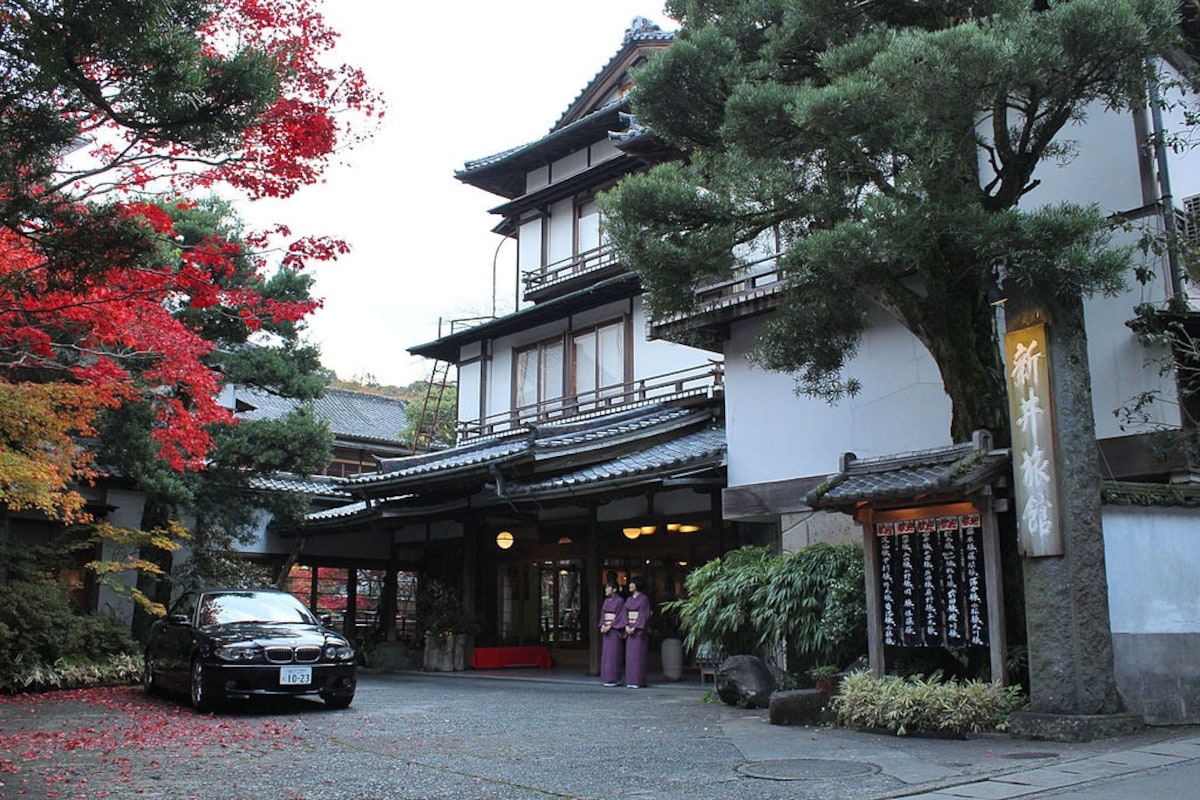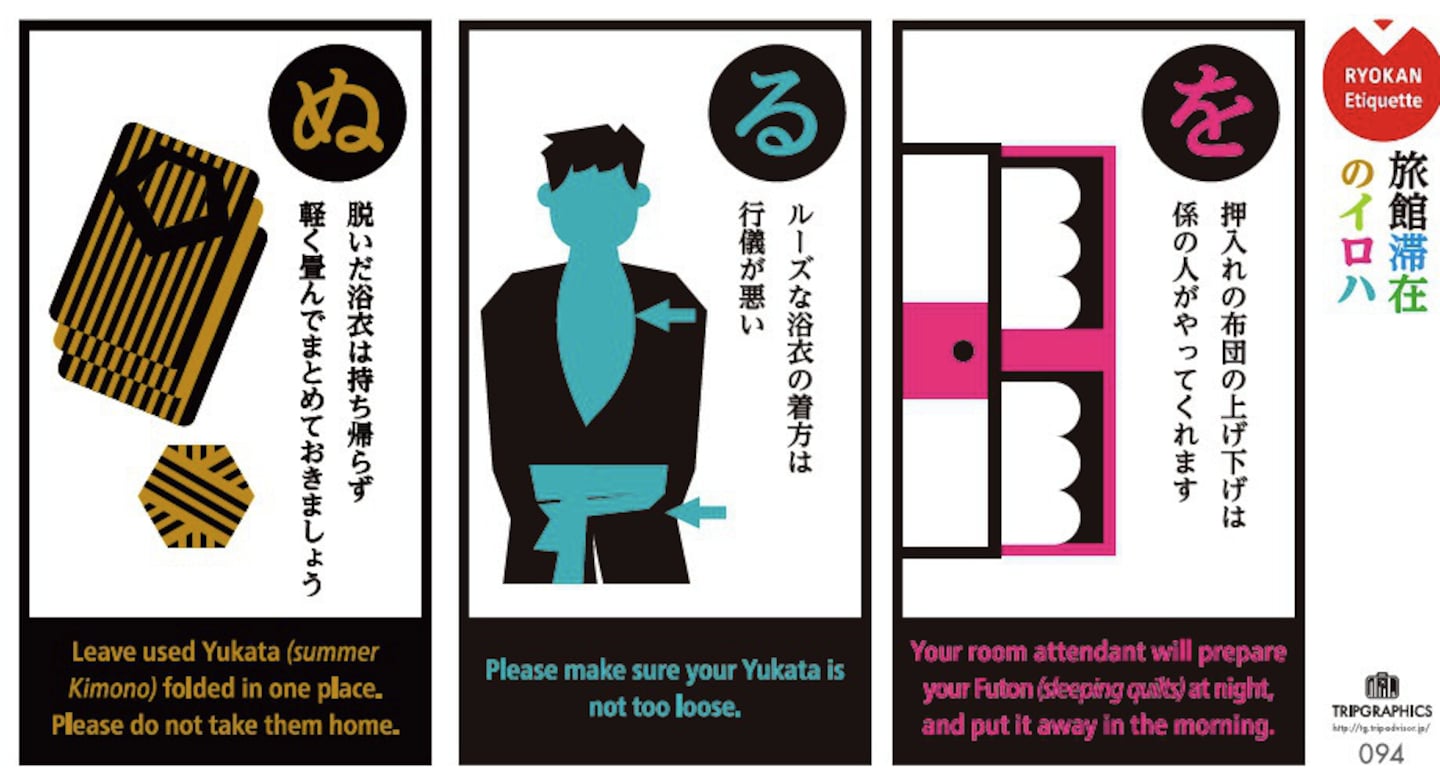The Dos & Don'ts of Staying at a 'Ryokan'
Traditional Japanese hotels or ryokan can trace their roots all the way back to the Edo Period (1603–1868). Therefore, in order to keep that atmosphere, there are unspoken etiquette rules. But how are you supposed to know what they are before you spend a night at a ryokan? Luckily Trip Advisor Japan has published a list of tips.
By SoraNews24
https://commons.wikimedia.org/wiki/Category:Ryokan#/media/File:Arai_Ryokan_Entrance.jpg
Pictured above is the Arai Ryokan in Izu City, Shizuoka Prefecture.
The tips are illustrated to look like set of cards teaching the characters from the Japanese syllabary, which instructs visitors on the right way to enjoy a Japanese inn. Some are as obvious as telling guests not to take stuff home with them, but there are others that really ought to be given your full attention.
Staying in a ryokan (which, incidentally, is pronounced ryo-kan rather than rai-o-kan as Westerners unfamiliar with the Japanese language often pronounce it) is a lot of fun and can be tremendously relaxing, but there are a number of potential pitfalls to watch out for. Follow Trip Advisor Japan’s advice (and our additional explanations) here to ensure your visit to a traditional Japanese hotel is faux pas-free.
http://tg.tripadvisor.jp/ryokan-etiquette/
It should come as no surprise to learn that a traditional Japanese hotel should stick to the age-old practice of removing one’s shoes when indoors. In the hotel reception you’ll find pairs of slippers. These are not optional, so be sure to remove your outdoor shoes and slip them on. They might not fit or be especially comfortable, but don’t worry about it; these are only for use when moving around the hotel and are to be removed when you’re in your room (don’t walk on the tatami wearing shoes of any kind), so rest assured that you won’t have to wear these often decidedly unfashionable-looking shoes for the entirety of your stay.
http://tg.tripadvisor.jp/ryokan-etiquette/
Inside your room, you’ll find packets of tea, chawan teacups which look like tiny bowls, a little teapot and maybe some small snacks such as rice crackers to accompany them. These are completely free and will be kept stocked by the ryokan staff, so help yourself. There will usually be a small table with zabuton cushions and zaisu (lit. “sit chairs,” which look like chairs without legs) to sit around and enjoy a relaxing cup of tea.
http://tg.tripadvisor.jp/ryokan-etiquette/
As mentioned, ryokan are often considered places to unwind rather than somewhere to crash while sightseeing (though you can of course use them for that), so it’s best to think of them more like health spas than Holiday Inns. Be extra quiet when outside your room, move around gently and don’t be “that guy” in the hallway talking loudly on his phone or shouting to his buddies. This of course goes for any decent hotel, but boisterous behavior is considered especially irksome at a ryokan
.
http://tg.tripadvisor.jp/ryokan-etiquette/
First-time visitors to ryokan may be confused when they enter their room and discover neither beds nor futons. Not to worry; the staff will come to your room (usually around dinner time) and lay the futons out for you. This may seem odd, almost servant-like even, but it means you’ll have much more space in your room during the day and is all part of the ryokan experience. Tipping is not required, and many ryokan staff will find the very idea of being offered money to do their job repugnant, so keep your yen in your pocket.
http://tg.tripadvisor.jp/ryokan-etiquette/
You’ll find your yukata—which guests wear when back for the evening or exploring the hotel, dining room included—in the cupboard of your room, neatly folded and complete with a small cotton belt to tie it. It may look a little flimsy, but you’re only borrowing it while you’re there. When you’ve finished and are checking out, be sure to leave your yukata where you found it, no matter how attached to this piece of genuinely wonderful loungewear you become during your stay. This is probably obvious to most people, but since Trip Advisor went to the trouble of telling people not to pack their yukata in their suitcase (which should be kept off the tatami, by the way) we’re guessing some ryokan have had more than a few go missing.
http://tg.tripadvisor.jp/ryokan-etiquette/
Pretty much every guest room in a ryokan will have an area called a tokonoma in it. This is purely for decorative purposes and will almost always include some form of scroll, artwork, ornate bonsai tree or flowers. It also looks like an ideal space to store a few suitcases, but is actually the worst possible place you could do so, so keep it clear at all times and soak up the Japanese ambiance.
http://tg.tripadvisor.jp/ryokan-etiquette/
Speaking of yukata, be sure to keep it tightly closed. You’ll see a lot of Japanese folks walking around with theirs closed to the point that barely an inch of flesh below the neck is visible. It looks a bit odd, especially for somewhere you’re supposed to be relaxing, but this is actually the correct way to wear it, so keep that belt tight. (Oh and yes, you’re supposed to wear underpants under it!)
Last but not least, there’s the important matter of how to put on your yukata. As illustrated here, men should tie their belt at the usual hip height, women a little higher. Much more important than that, however, is that the left side should always be on top. Traditionally, corpses are dressed with their robes right-over-left, so it’s definitely not a look you’ll want to replicate.
With that little lot you should be more than ready to enjoy your visit, but if you’re still curious or worried about putting your foot in it, be sure to head over to Trip Advisor Japan for more ryokan etiquette tips!
Related Stories:
New Shibuya capsule hotel targets women visiting from overseas with gorgeous bath and more
Low-cost Japanese inn welcomes foreign guests with hot springs, sake tastings, cosplay backdrops
Beautiful, 100-year-old Japanese guest house is so cheap, for some guests it’s free




